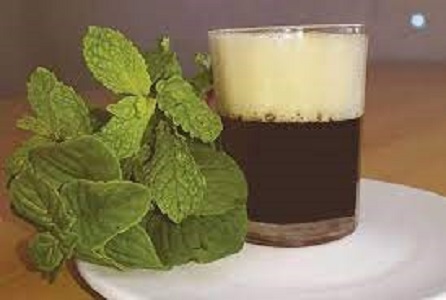By Prof. Raphael Nyarkotey Obu

The writer
Attaya as Aphrodisiac: Boosts Libido and Sexual Pleasure

Don’t be too quick to judge as I have noticed in the Gambia without reading. I admonished the fact that desserts in the Gambia are loaded with too much sugar. This can be dealt with through proper education and awareness. Besides, it should not make us shun the natural remedies, delicacies, and cuisines we have in the Gambia. The health benefits are more if we can cut down the sugar, or better still prepare them ourselves. Attaya, wonjo, and many others have so many benefits, but we end up overburdening our health with sugar.
Don’t be surprised to read that a cup of attaya can help improve your sex drive in both men and women. This is because attaya is green tea, and science has revealed the potency of green tea to spice up your sex life.
Attaya, widely known in the Gambia, Sierra Leone, Senegal, Liberia, Ghana, and other African countries is akin to Matcha in Japan. So, Attaya is African green tea as I will call it. The only disappointment is that attaya is still not cultivated in Africa. It is cultivated by the Chinese and exported to Africa. I have written extensively on the benefits of attaya since my arrival in the Gambia, but I felt I needed to share this with you.
Aphrodisiacs?
Aphrodisiacs were named after Aphrodite, the Grecian goddess of love. According to Greek mythology, Aphrodite originally came from the ocean and took her shape from sea form.
What makes attaya an aphrodisiac?
The Gambia attaya is from green tea and has an intimate effect due to the powerful feel-good effect triggered by L-theanine. L-theanine, which is found in large quantities in green tea, has been studied to be an excellent social lubricant that lowers anxiety and stress levels, allowing individuals to make genuine connections and authentic conversations. L-theanine was discovered as a constituent of green tea in 1949 by Sakato and in 1964 was approved as a food additive in Japan.
In my article on attaya and brain function, I highlighted that L-theanine increases dopamine and serotonin production in the brain with evidence from human electroencephalograph (EEG) studies showing that it has a direct effect on the brain. L-theanine significantly increases activity in the alpha frequency band which indicates that it relaxes the mind without inducing drowsiness.
Green tea has been used for centuries as a natural aphrodisiac in Japan, tastefully setting the stage for intimacy with its fragrant aromatic chemicals and natural libido-boosting compounds (Ali et al. 2013).
Old research (Chen et al. 2013) has unexpectedly found that tea drinking was positively related to sexual orgasm and sexual satisfaction in female hypertensive patients. The study, therefore, hypothesizes that long-term regular consumption of tea may play a role in sexual activity.
Also, a flavonoid called epigallocatechin gallate (EGCG) can lower your testosterone levels if you drink enough green tea. However, moderate consumption of green tea may provide health benefits due to a compound called catechin. Catechin’s antioxidant properties aid in the elimination of free radicals that would otherwise damage blood vessel linings and compromise blood flow.
L-theanine triggers the pleasure centre of the brain, releasing dopamine.
One recent study by Baba et al. (2021) found that green tea contains significant concentrations of l-theanine, which has been heavily studied to increase dopamine generation in men and women. Dopamine — released when the body consumes l-theanine from green tea powder — is a chemical neurotransmitter that triggers the pleasure centre in your brain. So when you drink attaya, it naturally boosts blood flow, alleviates anxiety, and increases overall sexual attraction and enjoyment.
Attaya caffeinated but has an effect on sex drive for both men and women
Studies admonished the effect of green tea during sex. Hence, drinking attaya can help. According to Russ Mason(2008), two small human studies showed that within 30-40 minutes of consuming 50 or 200 mg of L-theanine, there is an increase in alpha wave activity/electrical signals produced by the brain. The perceived relaxation effect in the subjects coincided with the detection of alpha waves. This shows that L-theanine fosters a state of alert relaxation, which is consistent with the fact that anxious people have fewer or smaller alpha waves.
Other same studies found that L-theanine, at realistic dietary levels, has a significant effect on the general state of mental alertness or arousal. It is well established that female sexual dysfunctions and low desire, in particular, are frequently associated with an elevated level of psychological stress. Consequently, anything that can be done to promote relaxation and reduce the effects of stress may be able to help. The amino acid L-theanine fits this description.
Recent studies by (Peng et al. 2021; Ali et al. 2013) established that green tea is loaded with large amounts of caffeine, which has been studied to increase sexual desire — especially among women. The calming effect of green tea also improves your holistic sex drive, increasing energy and endurance during intercourse among men and women.
Attaya: erectile dysfunction and longer-lasting erections.
This is what I always pray for. This is the response: Keske et al. (2015) study confirmed that green tea powder lowers blood pressure and improves circulation by triggering a natural process known as vasodilation.
Vasodilation helps the relaxation of the blood vessels and supports the body and brain to get extra oxygen and nutrients. Hence, drinking green tea powder even was reported to help men achieve hard and more enjoyable, longer-lasting erections. One animal-based study (Neves et al. 2008) found that signs of erectile dysfunction were reduced and largely reduced by giving a concentration of green tea serum for six months.
Another study, by Keske et al. (2015) that green tea’s libido-boosting benefits are also due to the exceptional content of polyphenols and catechins it contains. For instance, one top green tea product matcha is cultivated, grown, and harvested in a special way to safeguard maximum potency. Catechins work in the body, killing off free radicals and stopping damage to inflamed blood vessels. They cause blood vessel cells to expel nitric oxide, which increases the size of blood vessels and improves overall blood flow.
Green tea has been shown to increase sex drive in menopausal women.
Elara Hadjipateras’s (2022) article asserts that there is one top green tea product known as matcha, which studies have found to increase sex drive in menopausal women. Matcha has even been studied to help reduce and alleviate the signs and symptoms of menopause in women — including the lack of interest in sex.
Hence, regularly drinking green tea products such as attaya or matcha can help balance estrogen levels and has been shown to work extraordinarily well for improving the sex lives of menopausal women.
Green tea product has also been shown to combat signs and symptoms of depression. Just in case you feel some decrease in the sexual drive due to seasonal depression, regularly drinking attaya or green tea products may help.
Take Home
Attaya green tea has proven in research that it can be an easy and effective natural aphrodisiac that boosts libido and overall sexual pleasure while also offering a grounding and blissful effect.
I am just excited that attaya or green tea products can be used as a natural aphrodisiac, though there is still more research that needs to be done when it comes to interaction with prescription medications and other common health conditions.
In conclusion, though several factors affect our libido, and have to be taken in holistic ways, scientific natural remedies have been proven to help.
NB:
Prof. Nyarkotey has strict sourcing guidelines and relies on peer-reviewed studies, academic research institutions, and medical associations to justify his write-ups. My articles are for educational purposes and do not serve as medical advice for Treatment. I aim to educate the public about evidence-based scientific Naturopathic Therapies.
The writer is a Professor of Naturopathic Healthcare, a Medical Journalist, and a science writer. President, Nyarkotey University College of Holistic Medicine & Technology (NUCHMT)/African Naturopathic Foundation, Ashaiman, Ghana. Currently BL Candidate at the Gambia Law School, Banjul. E. mail: [email protected]. +2207452652 (for more information)
References
- Ali, J., Ansari, S., & Kotta, S. (2013). Exploring scientifically proven herbal aphrodisiacs. Pharmacognosy Reviews, 7(1), 1. https://doi.org/10.4103/0973-7847.112832
- Baba, Y., Inagaki, S., Nakagawa, S., Kaneko, T., Kobayashi, M., & Takihara, T. (2021). Effects of l-Theanine on Cognitive Function in Middle-Aged and Older Subjects: A Randomized Placebo-Controlled Study. Journal of Medicinal Food, 24(4), 333–341. https://doi.org/10.1089/jmf.2020.4803
- Chen XJ, Pang D, Li LP, Chen YQ, Tan XR. A hypothesis on the relationship between tea drinking and sexual activity. World J Hypertens 2013; 3(4): 32-36 [DOI: 10.5494/wjh.v3.i4.32]
- Keske, M. A., Ng, H. L., Premilovac, D., Rattigan, S., Kim, J. A., Munir, K., Yang, P., & Quon, M. J. (2015). Vascular and metabolic actions of the green tea polyphenol epigallocatechin gallate. Current medicinal chemistry, 22(1), 59–69. https://doi.org/10.2174/0929867321666141012174553
- Neves, D., Assunção, M., Marques, F., Andrade, J. P., & Almeida, H. (2008). Does regular consumption of green tea influence expression of vascular endothelial growth factor and its receptor in aged rat erectile tissue? Possible implications for vasculogenic erectile dysfunction progression. AGE, 30(4), 217–228. https://doi.org/10.1007/s11357-008-9051-6
- Opuwari, C., & Monsees, T. (2020). Green tea consumption increases sperm concentration and viability in male rats and is safe for reproductive, liver and kidney health. Scientific Reports, 10(1). https://doi.org/10.1038/s41598-020-72319-6
- Patisaul, H. B., & Jefferson, W. (2010). The pros and cons of phytoestrogens. Frontiers in Neuroendocrinology, 31(4), 400–419. https://doi.org/10.1016/j.yfrne.2010.03.003
- Peng, X., Zhang, M., Wang, X., Wu, K., Li, Y., Li, L., Yang, J., Ruan, Y., Bai, R., Ma, C., & Liu, N. (2021). Sex differences in the association between green tea consumption and hypertension in elderly Chinese adults. BMC Geriatrics, 21(1). https://doi.org/10.1186/s12877-021-02431-3
- Samavat, H., Wu, A. H., Ursin, G., Torkelson, C. J., Wang, R., Yu, M. C., Yee, D., Kurzer, M. S., & Yuan, J. M. (2019). Green Tea Catechin Extract Supplementation Does Not Influence Circulating Sex Hormones and Insulin-Like Growth Factor Axis Proteins in a Randomized Controlled Trial of Postmenopausal Women at High Risk of Breast Cancer. The Journal of Nutrition, 149(4), 619–627. https://doi.org/10.1093/jn/nxy316
- Webster, A. D., Finstad, D. A., Kurzer, M. S., & Torkelson, C. J. (2018). Quality of life among postmenopausal women enrolled in the Minnesota Green Tea Trial. Maturitas, 108, 1–6. https://doi.org/10.1016/j.maturitas.2017.10.013
- Jenkinson, C., Petroczi, A., Barker, J., & Naughton, D. P. (2012). Dietary green and white teas suppress UDP-glucuronosyltransferase UGT2B17 mediated testosterone glucuronidation. Steroids, 77(6), 691–695. https://doi.org/10.1016/j.steroids.2012.02.023









